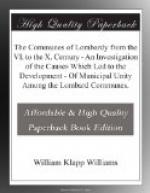In the old Lombard constitution we have seen the gastald, chiefly, however, in the matter of judicial decisions, exercise a controlling influence on the arbitrary action of the duke; but as the power of the count varied from that of the duke, so that of the scabinus differs from that of the gastald, only perhaps in a greater degree. At the time when the count assumes the place of his predecessor the duke, the scabinus displaces the gastald, although he cannot be said to have assumed exactly the same position as the latter, nor to have filled it in precisely the same way. The scabinus did not have, of course, any direct limiting control over the actions of the count; for any such power in the hands of a body of lesser officers would have been alike contrary to the spirit of feudalism which characterized the age, and impossible to its forms; but being the principal judicial functionaries of the district, into their hands fell most of the cases which formerly went to the placita of the count; and while the wish of the great emperor, that even the meanest subject of the realm should receive impartial justice at their hands, might have failed in its effect, its fulfilment was made more sure by the method prescribed for the election of the officers whose duty it was to execute it.[76]
In describing the method by which the scabini gained their office, I am in some doubt as to the proper terms to be employed. I have just made use of the word “election,” but cannot let it stand without some qualification. It was not an election in the strict sense of the word as we now understand it, but it was as near an approach to a popular choice as was possible in the age in which it existed. The citizens of a municipality did not nominate and elect by their votes a popular magistrate, as some writers would have us believe; for such a proceeding would have been an anomaly in the eighth century under the rule of a Frankish emperor. But the people had a voice, and from the frequent mention of their intervention it would seem an important voice, in the selection of those who were to be their judges, and who were to assist in representing them in the royal assembly. The original appointments were made by some higher power, in most cases the missi regii, the direct representatives of the king; but these were made not arbitrarily, but always “cum totius populi consensu.” This was the important point; it was so far a popular office that the free consent of the people was always necessary to make valid the appointment of any incumbent. According to the ideas and customs of the eighth century, such a method of procedure would represent a fairly popular election; for we know well that in the times of the greatest freedom, the Teutonic idea of a popular vote never went beyond the mere expression of assent or dissent by the assembled freemen. The initiative was always left to the king or chief who conducted the meeting, just as much as it was in the ancient




